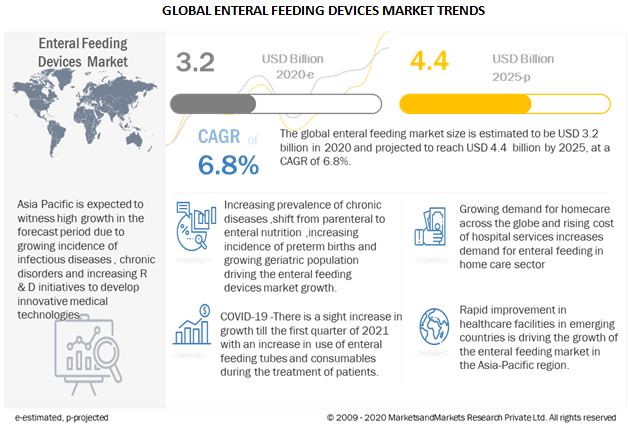Enteral Feeding Devices Market: Growing Demand for Enteral Feeding in the Home Care Sector
This report aims to provide detailed insights
into the global enteral
feeding devices market. It provides valuable information on
the type, procedure, application, and region in the market. Furthermore, the
information for these segments, by region, is also presented in this report.
Leading players in the market are profiled to study their product offerings and
understand the strategies undertaken by them to be competitive in this market.
Revenue
Growth Analysis:
The Enteral Feeding Devices Market is projected to reach $4.4 billion by 2025
from $3.2 billion in 2020, at a CAGR of 6.8% during the forecast period.
Download PDF Brochure:
https://www.marketsandmarkets.com/pdfdownloadNew.asp?id=183623035
Key Factors Driving Market Growth:
The
increasing as rising healthcare costs; surge in the number of preterm births;
growth in the aging population; rising prevalence of chronic diseases such as
diabetes, cancer, gastrointestinal diseases, and neurological disorders;
growing awareness of enteral nutrition; and rapid improvements in healthcare
facilities in emerging countries are expected to further drive the enteral
feeding devices market during the forecast period. Moreover, the shift from
parenteral nutrition to enteral nutrition and growing adoption of and demand
for enteral feeding tubes in home and ambulatory care settings are also
expected to drive the market in the coming years.
Technological Advancement:
Technological advancements
have also led to the development of compact and portable enteral feeding pumps,
which are constructed using materials that prevent cracking in high-stress
applications. Advanced features in pumps include appropriate programming
options, programmed flushing intervals, multiple language options, occlusion
pressure alarm options, history of previous feed rates, and screen and program
lock-out features to prevent manipulation. Enhancements in pump designs
(according to the requirements of healthcare providers and patients) and growth
in the home healthcare market (enabling enteral feeding of nutrients to
patients at home) are expected to propel the growth of the enteral feeding
pumps market.
Enteral Feeding Tubes Segment:
The enteral
feeding tubes segment accounted for the largest share of the enteral feeding
devices market. The rising adoption of enteral feeding has resulted in an
increase in the demand and uptake of enteral feeding tubes across the globe.
These device modifications include the use of bright orange or purple tubing
(solid and striped), "enteral-only" labels, and manufacturer-specific
enteral-only or non-IV compatible connectors. Moreover, the Global Enteral
Device Supplier Association (GEDSA), an international working group of enteral
feeding tube manufacturers, distributors, and suppliers, has introduced new
enteral connectors (ENFit) that conform to the new ISO standards. This
universal connector design has been introduced to improve patient safety and
reduce the incidence of medical device tubing misconnections.
Request Sample Report:
https://www.marketsandmarkets.com/requestsampleNew.asp?id=183623035
APAC Region to Dominate The Enteral Feeding Tubes Market:
Asia
Pacific is estimated to be the fastest-growing regional market.
Factors such as the increasing number of preterm births, rising geriatric
population, growing awareness of enteral nutrition, and the rapid development
of healthcare facilities in several APAC countries are driving the growth of
this market. Key players have shifted their focus to emerging economies in
these regions,and are focusing on expansions and acquisitions to garner a
greater enteral feeding tubes market share in the
coming years.
Key Players in Enteral Feeding Tubes Market:
The prominent players in Enteral Feeding Devices Market are Fresenius Kabi AG (Germany), Avanos Medical, Inc.
(US), Cardinal Health, Inc. (US), B. Braun Melsungen AG (Germany), Abbott Laboratories
(US), Becton, Dickinson and Company (US), Boston Scientific Corporation (US),
Cook Medical, Inc. (US), CONMED Corporation (CONMED) (US), Nestlé S.A. (Switzerland), Danone (France), Moog, Inc. (US),
Vygon (France), Amsino International
(US), and Applied Medical Technology, Inc. (US).




Comments
Post a Comment